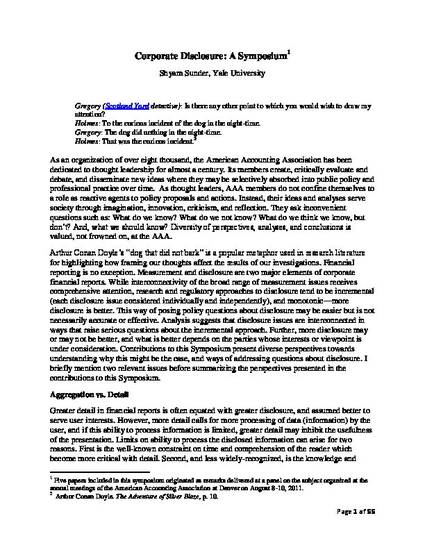
Unpublished Paper
Corporate Disclosure: A Symposium
(2011)
Abstract
Gregory (Scotland Yard detective): Is there any other point to which you would wish to draw my attention? Holmes: To the curious incident of the dog in the night-time. Gregory: The dog did nothing in the night-time. Holmes: That was the curious incident. 2 As an organization of over eight thousand, the American Accounting Association has been dedicated to thought leadership for almost a century. Its members create, critically evaluate and debate, and disseminate new ideas where they may be selectively absorbed into public policy and professional practice over time. As thought leaders, AAA members do not confine themselves to a role as reactive agents to policy proposals and actions. Instead, their ideas and analyses serve society through imagination, innovation, criticism, and reflection. They ask inconvenient questions such as: What do we know? What do we not know? What do we think we know, but don‘t? And, what we should know? Diversity of perspectives, analyses, and conclusions is valued, not frowned on, at the AAA. Arthur Conan Doyle‘s ―dog that did not bark‖ is a popular metaphor used in research literature for highlighting how framing our thoughts affect the results of our investigations. Financial reporting is no exception. Measurement and disclosure are two major elements of corporate financial reports. While interconnectivity of the broad range of measurement issues receives comprehensive attention, research and regulatory approaches to disclosure tend to be incremental (each disclosure issue considered individually and independently), and monotonic—more disclosure is better. This way of posing policy questions about disclosure may be easier but is not necessarily accurate or effective. Analysis suggests that disclosure issues are interconnected in ways that raise serious questions about the incremental approach. Further, more disclosure may or may not be better, and what is better depends on the parties whose interests or viewpoint is under consideration. Contributions to this Symposium present diverse perspectives towards understanding why this might be the case, and ways of addressing questions about disclosure. I briefly mention two relevant issues before summarizing the perspectives presented in the contributions to this Symposium
Disciplines
- Business and
- Accounting
Publication Date
December 31, 2011
Citation Information
Shyam Sunder. "Corporate Disclosure: A Symposium" (2011) Available at: http://works.bepress.com/shyam-sunder/413/